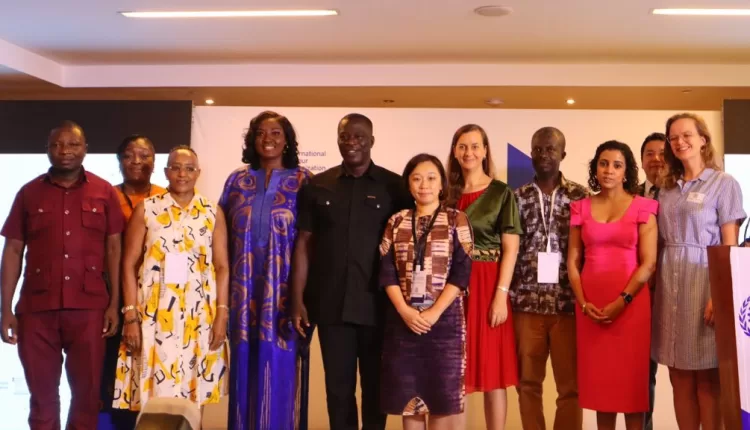The International Cocoa Initiative (ICI), the Government of Ghana, and other global partners have launched a ground-breaking initiative to eliminate child labour in African supply chains.
The intervention, dubbed “Accelerating Together Action Against Child Labour in Ghana, Multi-stakeholder and Multi-sectoral Initiatives,” was first implemented under the auspices of the International Labour Organisation in six African countries, namely Nigeria, Cote d’Ivoire, Mali, Uganda, Malawi, and Egypt.
ACCEL Africa, a significant move towards eradicating child labour and promoting sustainable development in target supply chains in Africa, brings together resources, knowledge, and expertise from the ILO, the International Cocoa Initiative (ICI), UNICEF, the World Bank, and the governments of the Netherlands, Switzerland, and Japan.
Ghana and Kenya have been chosen to benefit from the second phase implementation of ACCEL Africa as the partners continue to target the root causes of child labour in supply chains, particularly in agriculture, mining, and the rural economy.
The initiative involves three distinct projects, including the Child Labour Multisectoral and Multistakeholder Public-Private Partnership (PPP), supported by the Swiss State Secretariat for Economic Affairs (SECO), the Swiss Platform for Sustainable Cocoa (SWISSCO), UNICEF, and ICI.
It will be implemented in the Bibiani-Anwiaso-Bekwai, Asunafo North, Ayensuano, and Assin South districts of Ghana from 2024 to 2025, with a budget of US$4 million.
The PPP aims to establish a solid proof-of-concept to address child labour and improve protection, access to social services, employment opportunities, and learning outcomes for children and youth through public-private partnerships in cocoa-growing communities.
The second project under the initiative is Mainstreaming Child Protection through Child Labour Free Zones (CLFZ), which is supported by the Japan International Cooperation Agency (JICA).
The third leg of the multistakeholder and multisectoral initiative is the Accelerating Action for the Elimination of Child Labour in Supply Chains in Africa (ACCEL) Project, being financially supported by the Ministry of Foreign Affairs of the Netherlands and implemented by the ILO in the Wassa Amenfi East, Bia East, and Juaboso Districts of the Western and Western North Regions.
These three projects under the initiatives aim to address the root causes of child labour and contribute to the Sustainable Development Goal (SDG) 8.7, which aims to “end child labour in all its forms.”
The launch in the Ghanaian capital, Accra, brought policymakers, government officials, development partners, civil society organisations (CSOs), and the private sector.
Speaking at the ceremony, Ghana’s Minister for Employment and Labour Relations, Ignatius Baffour Awuah, regretted the multiplicity of small silo projects all attempting to tackle the menace of child labour in Ghana and elsewhere on the African continent.
He commended the ACCEL Africa initiative partners for pioneering the synchronisation of individual projects in alignment with the new Ghana Accelerated Action Plan Against Child Labour 2023–2027.
He appealed to other stakeholders to align their programmes with the national action plan to avoid duplication of projects and fragmentation of goals.
The Country Director of the International Cocoa Initiative (ICI), Mike Arthur, noted that the success of this multistakeholder and multisectoral initiative is a strong indication that the “days of silo approaches in tackling child labour are over.”
“We recognise the importance of having system approaches to address the nexus between child labour, poverty, education, and youth skilling and employability,” said Arthur.
The ICI Ghana country director emphasised that knowledge and data sharing will be the bedrock of the initiative’s success, encouraging all stakeholders to uphold that key principle.
“We need to have a holistic approach looking at health, education, WASH, nutrition, child protection, social protection, strong families, youth employment, etc, without this, we have no doubts in our minds that it will be extremely difficult, if not impossible, to eliminate child labour,” he added.
The ICI believes it is also important for local systems and governance to improve and for systems to interoperate by talking to and obeying one another.
More than 200 individuals attended the event, including Vanessa Phala, Country Director of ILO Country Office for Nigeria, Ghana, Liberia, Sierra Leone and Liaison Office for ECOWAS; Anne Kariuki, Representative Officer in Charge of UNICEF; and Dr. Ashwini Sebastian, Senior Agriculture Specialist from the World Bank.
Others were Momoka Suzuki, Chief Director of JICA; Naomi Tuinstra, representative of the Dutch Ambassador to Ghana; and Dr. Simone Haeberli, Deputy Head of Mission and Head of Cooperation of the Embassy of Switzerland in Ghana.
- Illegal Mining Threatening Ghana’s $230M Cocoa Rehabilitation - April 10, 2024
- Ghana Raises Cocoa Farmgate Price by 58.26% to GHC2,070 per bag - April 5, 2024
- New Standard for Measuring Cocoa Household Income Launched - April 5, 2024
